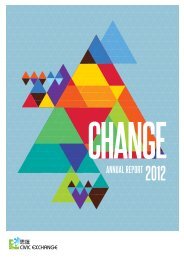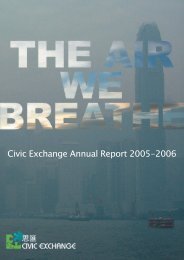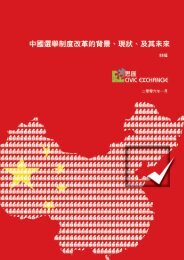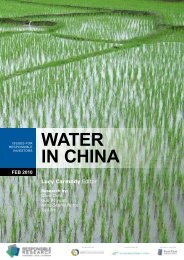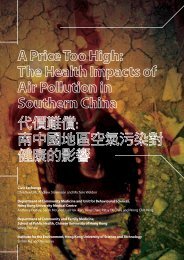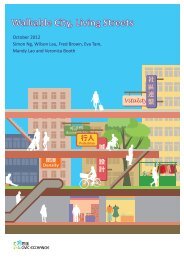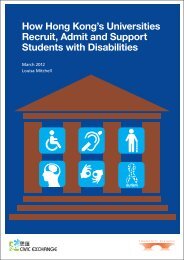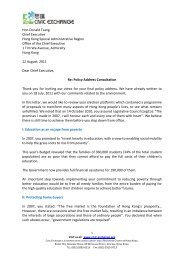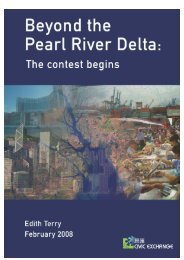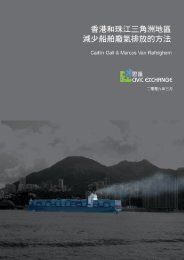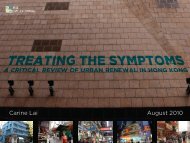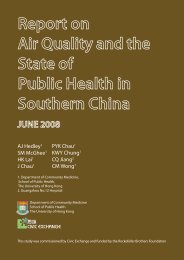Untitled - Civic Exchange
Untitled - Civic Exchange
Untitled - Civic Exchange
Create successful ePaper yourself
Turn your PDF publications into a flip-book with our unique Google optimized e-Paper software.
APPENDICES<br />
Appendix 2<br />
Agenda 21: "Recommended Principal Activities related to the Transport Sector"<br />
Selected sections of United Nations Conference on Environment and Development (UNCED),<br />
Agenda 21, 1992.<br />
Chapter 7, Section 7.52<br />
Promoting efficient and environmentally sound urban transport systems in all countries should be a<br />
comprehensive approach to urban-transport planning and management. To this end, all countries should:<br />
a. Integrate land-use and transportation planning to encourage development patterns that reduce<br />
transport demand;<br />
b. Adopt urban-transport programmes favoring high-occupancy public transport in countries, as<br />
appropriate;<br />
c. Encourage non-motorized modes of transport by providing safe cycleways and footways in urban<br />
and suburban centers in countries, as appropriate;<br />
d. Devote particular attention to effective traffic management, efficient operation of public transport<br />
and maintenance of transport infrastructure;<br />
e. Promote the exchange of information among countries and representatives of local and<br />
metropolitan areas;<br />
f. Re-evaluate the present consumption and production patterns in order to reduce the use of energy<br />
and national resources<br />
Chapter 9, Section 9.15<br />
Governments at the appropriate level, with the cooperation of the relevant United Nations bodies and, as<br />
appropriate, intergovernmental and non-governmental organizations, and the private sector, should:<br />
a. Develop and promote, as appropriate, cost-effective, more efficient, less polluting and safer<br />
transport systems, particularly integrated rural and urban mass transit, as well as environmentally<br />
sound road networks, taking into account the needs for sustainable social, economic and<br />
development priorities, particularly in developing countries;<br />
b. Facilitate at the international, regional, sub regional and national levels access to and the transfer<br />
of safe, efficient, including resource-efficient, and less polluting transport technologies,<br />
particularly to the developing countries, including the implementation of appropriate training<br />
programs;<br />
c. Strengthen, as appropriate, their efforts at collecting, analyzing and exchanging relevant<br />
information on the relation between environment and transport, with particular emphasis on the<br />
systematic observation of emissions and the development of a transport database;<br />
d. In accordance with national socio-economic development and environment priorities, evaluate<br />
and, as appropriate, promote cost-effective policies or programs, including administrative, social<br />
and economic measures, in order to encourage use of transportation modes that minimize<br />
adverse impacts on the atmosphere;<br />
e. Develop or enhance, as appropriate, mechanisms to integrate transport planning strategies and<br />
urban and regional settlement planning strategies, with a view to reducing the environmental<br />
impacts of transport;<br />
f. Study, within the framework of the United Nations and its regional commissions, the feasibility<br />
of convening regional conferences on transport and the environment.<br />
95



